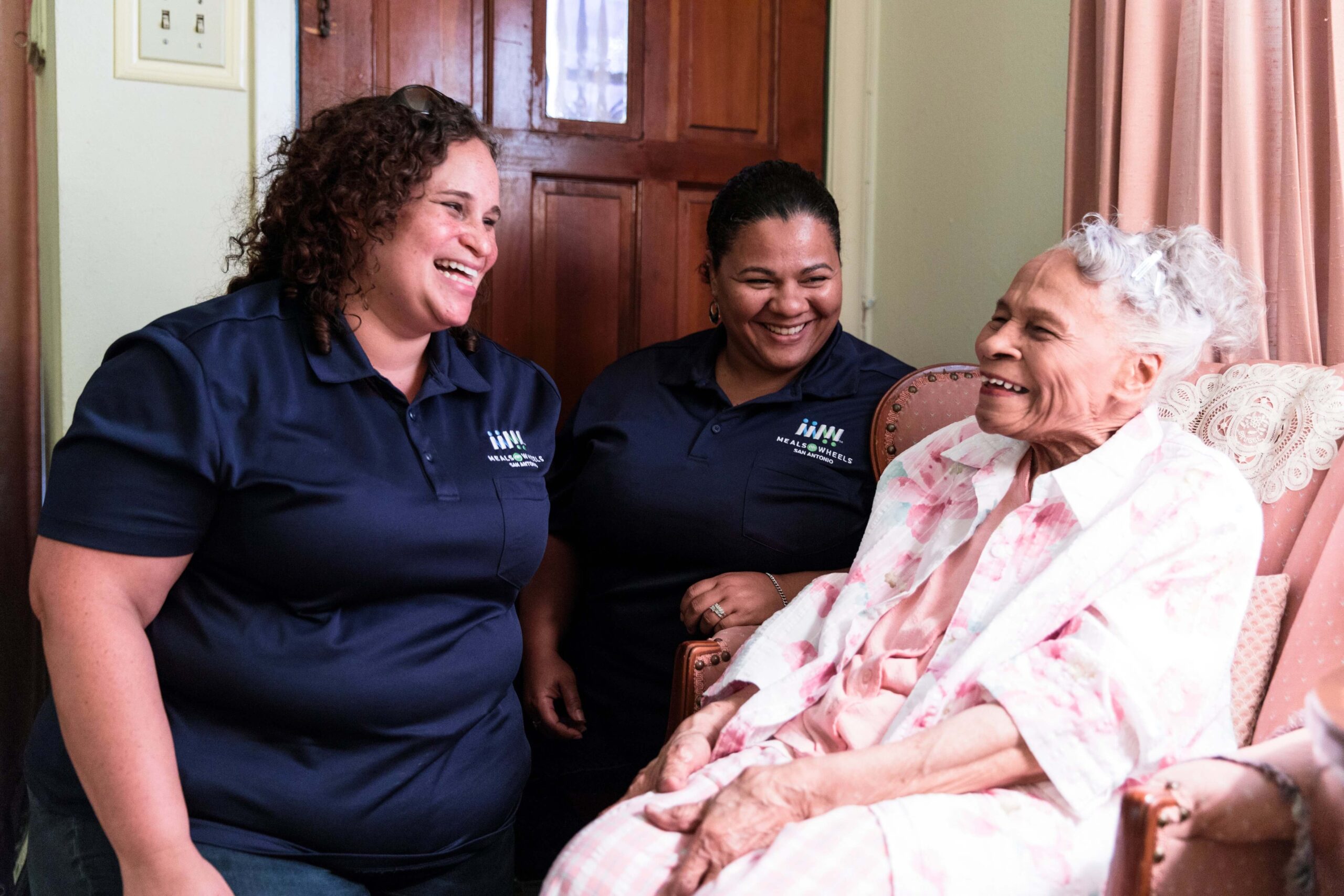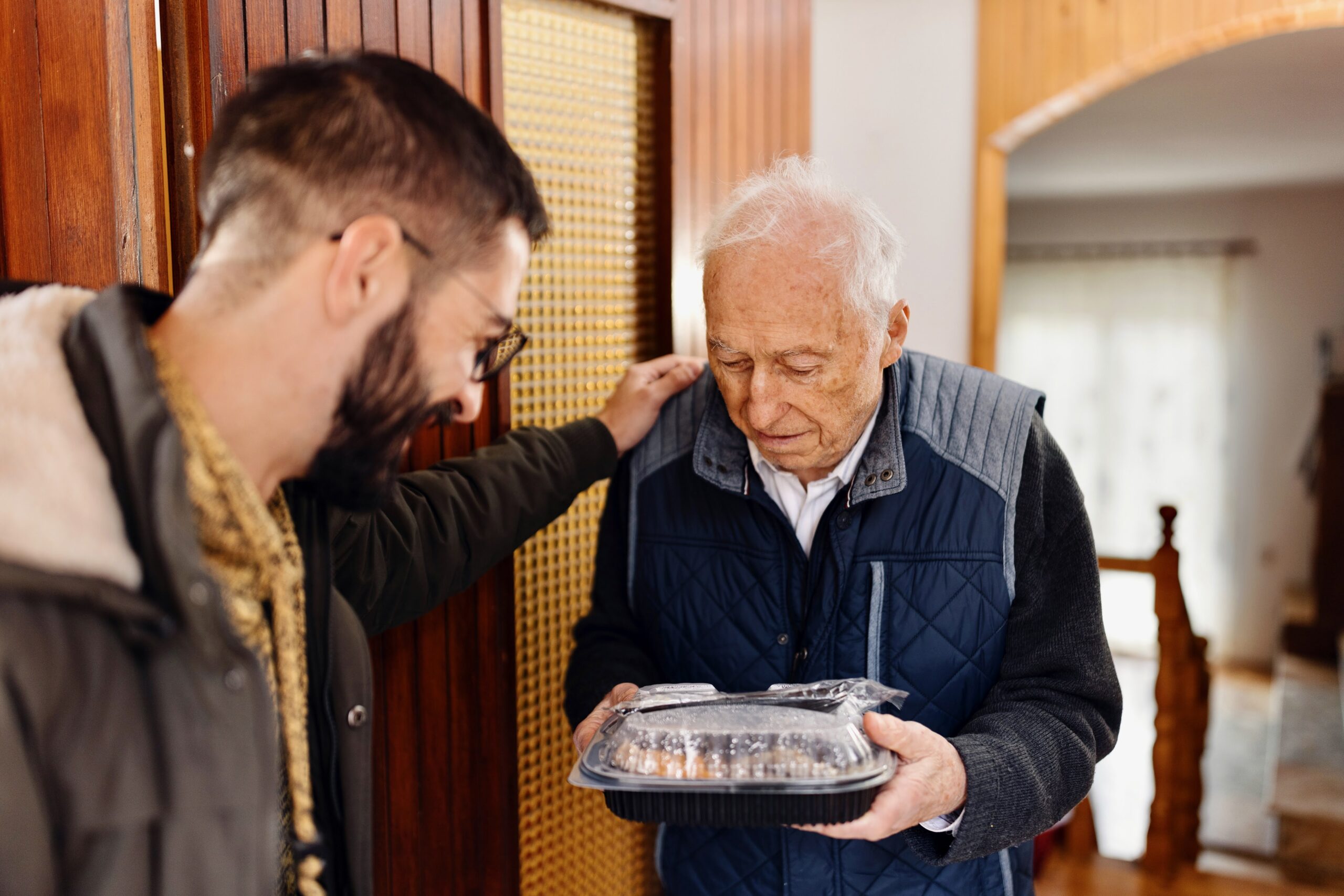Links & Downloads
Social isolation takes a huge toll on us mentally, emotionally and physically. Our social networks tend to shrink as we age due to retirement, loss, mobility challenges and declining health. Gaps in social support needs often intensify as older adults become more reliant on others to meet their increasing support needs, yet they have fewer people to rely on.1
It’s clear that social isolation and loneliness are growing public health concerns, as underscored by a 2023 advisory from the U.S. Surgeon General. The negative consequences of social isolation include anxiety, depression,2 cardiovascular disease,3 cognitive decline,4 a lower quality of life5 and increased use of health care services.6 7 Among older adults, chronic loneliness and social isolation can also increase the risk of developing dementia by about 50%.8 Homebound older adults are particularly vulnerable to social isolation and loneliness.

For more than 50 years, Meals on Wheels has worked to support our nation’s seniors by providing them with meals, social connection, vital resources, support and more. Meals on Wheels America partnered with researchers from the School of Public Health at Brown University to dive deeper into the issues of loneliness and social isolation by conducting a qualitative research project that evaluated the efficacy of social connection programming offered by the Meals on Wheels network.
Through 116 interviews with staff, volunteers and clients from six local Meals on Wheels providers, the research team gained valuable insights into the role that social isolation plays in seniors’ lives. They set out to understand the feasibility, effectiveness and sustainability of local Meals on Wheels providers’ current efforts, and assess the direct impact of social connection programming on Meals on Wheels clients.
I’m talking from my heart. I love this program. It makes me feel alive, like someone cares. And I know I’m not the only lonely senior.Meals on Wheels Client
Key Findings
The analyses revealed three key findings:
- The Meals on Wheels social connection programs studied — telephone reassurance, friendly visitor and activities/virtual programming — were all feasible and demonstrated the potential for long-term sustainability.
- The programs had positive impacts on social isolation and loneliness for all study participants, including Meals on Wheels clients, volunteers and staff.
- Four successful program components that can be transferable and scaled were identified.
- Commitment of resources throughout the organization allows social connection programs to achieve success through resource allocation, including administrative support, standard operating procedures, clear roles, data, and collaboration with the community.
- Engagement of staff, volunteers and clients at all levels of social connection programming ensures a consistent program understanding, which aids in assessing community needs, developing marketing materials and recruiting volunteers.
- Communication allows for clear understanding of the program mission and is reflected in volunteer training materials, client feedback, client and volunteer matching based on interests, and opportunities for volunteers to connect.
- Innovation, flexibility and creativity, which originally inspired the development of the social connection program, are critical for ongoing program adaptation to meet evolving client needs.

Expand it the best you can. This can be everywhere. Every state, every county. It’s overdue, because people are so lonely.Meals on Wheels volunteer
The research confirms what Meals on Wheels providers have known anecdotally for decades: Social connection programs are effective and truly make a difference in the lives of meal recipients. The Meals on Wheels network has been at the forefront of addressing the unique needs of homebound older adults, providing social connection programs that cater to their specific circumstances. It is imperative in addressing the epidemic of loneliness to drive additional funding that expands and sustains these transformative programs, so they can reach even more homebound older adults, ensuring they receive the care, companionship and support they deserve.
Download Full Report
In reproducing any excerpts of this report, please provide a credit that recognizes Meals on Wheels America, such as: Meals on Wheels America. (2023). Effective Solutions to Address Social Isolation and Loneliness Through Meals on Wheels. https://www.mealsonwheelsamerica.org/research/effective-solutions-to-address-social-isolation-and-loneliness-through-meals-on-wheels/
External Publications
“It Made Me Feel Like a Person Again”: Benefits of Meals on Wheels-Based Social Connection Programs, Gadbois, E. A., Brazier, J. F., Turner, J., Hawes, C., Florence, L. C., & Belazis, L., Journal of Applied Gerontology: The Official Journal of the Southern Gerontological Society, 2024
Making That Critical Connection, Goodman, L. & Florence, L.C., Generations Journal, 2020
Citations
- McPherson M, Smith-Lovin L, Brashears ME. Social Isolation in America: Changes in Core Discussion Networks over Two Decades. American Sociological Review. 2006/06/01 2006;71(3):353-375.
- Santini ZI, Jose PE, York Cornwell E, et al. Social disconnectedness, perceived isolation, and symptoms of depression and anxiety among older Americans (NSHAP): a longitudinal mediation analysis. The Lancet Public Health. 2020/01/01/ 2020;5(1):e62-e70.
- Barth J, Schneider S, von Känel R. Lack of social support in the etiology and the prognosis of coronary heart disease: a systematic review and meta-analysis. Psychosomatic medicine. 2010;72(3):229-238.
- Bassuk SS, Glass TA, Berkman LF. Social disengagement and incident cognitive decline in community-dwelling elderly persons. Annals of internal medicine. 1999;131(3):165-173.
- Courtin E, Knapp M. Social isolation, loneliness and health in old age: a scoping review. Health & Social Care in the Community. 2017;25(3):799-812.
- Gerst-Emerson K, Jayawardhana J. Loneliness as a Public Health Issue: The Impact of Loneliness on Health Care Utilization Among Older Adults. American Journal of Public Health. 2015/05/01 2015;105(5):1013-1019
- Valtorta NK, Moore DC, Barron L, Stow D, Hanratty B. Older Adults’ Social Relationships and Health Care Utilization: A Systematic Review. Am J Public Health. Apr 2018;108(4):e1-e10.
- Lazzari C, Rabottini M. COVID-19, loneliness, social isolation and risk of dementia in older people: a systematic review and meta-analysis of the relevant literature. Int J Psychiatry Clin Pract. 2022 Jun;26(2):196-207.

